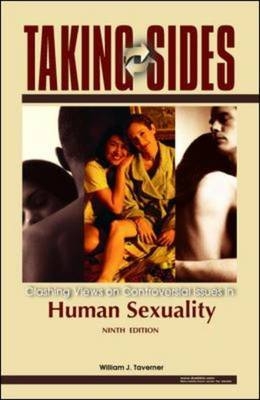PART 1. Sexual Health Issues ISSUE 1. Should Sexuality Education Be Comprehensive? YES: David Satcher, from The Surgeon General's Call to Action to Promote Sexual Health and Responsible Sexual Behavior (United States Department of Health and Human Services, July 9, 2001) NO: Don Feder, from "Devil Is in the Details of Surgeon General's Sex Report," Insight on the News (August 6, 2001) Former United States Surgeon General David Satcher outlines his call to action to promote sexual health and responsible sexual behavior. Dr. Satcher expresses support for a comprehensive approach to sexuality education, inclusive of teaching about abstinence, contraception, and safer sex to help young people avoid unplanned pregnancy and sexually transmitted infections. Editorialist Don Feder argues that comprehensive sexuality education is not effective, and criticizes the methods used to compile the surgeon general's report, which includes interviews with commercial sex workers. ISSUE 2. Should Schools Make Condoms Available to Students? YES: Sally Guttmacher, Lisa Lieberman, David Ward, Nick Freudenberg, Alice Radosh, and Don Des Jarlais, from "Condom Availability in New York City Public High Schools: Relationships to Condom Use and Sexual Behavior," American Journal of Public Health (September 1997) NO: Edwin J. Delattre, from "Condoms and Coercion: The Maturity of Self Determination," Vital Speeches of the Day (April 15, 1992) Researchers Sally Guttmacher et al. maintain that their study of New York City high school students who received both condoms and an HIV/AIDS education program versus Chicago high school students who received only HIV/AIDS education proves that distributing condoms in schools does not increase sexual activity but does result in students using condoms more often when they are sexually active. Professor of education Edwin J. Delattre rejects the argument that there is a moral obligation to save lives by distributing condoms in schools. He asserts that distributing condoms in schools promotes morally unacceptable casual sexual relationships. ISSUE 3. Is Masters and Johnson's Model an Accurate Description of Sexual Response? YES: Stephanie Ann Sanders, from "Physiology of Sex," Microsoft Encarta Online Encyclopedia (2004) NO: Paul Joannides, from "The HSRC-Is Everything Better in Black & White?" An Original Essay Written for This Volume (2004) Stephanie Ann Sanders, a director and scientist with the Kinsey Institute and a contributing author to the Encarta Online Encyclopedia, summarizes Masters and Johnson's Human Sexual Response Cycle. Paul Joannides, author of the popular book The Guide to Getting It On!, says that the Human Sexual Response Cycle is a "one-size-fits-all" model that does not account for individual variations. ISSUE 4. Is Oral Sex Really Sex? YES: Rhonda Chittenden, from "Oral Sex Is Sex: Ten Messages about Oral Sex to Communicate to Adolescents," Sexing the Political (May 2004) NO: Nora Gelperin, from "Oral Sex and Young Adolescents: Insights from the 'Oral Sex Lady,'" Educator's Update (September 2004) Sexuality educator Rhonda Chittenden says that it is important for young people to expand their narrow definitions of sex and understand that oral sex is sex. Chittenden offers additional educational messages about oral sex. Sexuality trainer Nora Gelperin argues that adult definitions of oral sex are out of touch with the meaning the behavior holds for young people. Rather than impose adult definitions of intimacy, educators should be seeking to help young people clarify and understand their own values. ISSUE 5. Should Emergency Contraception Be Available over the Counter? YES: Jane E. Brody, from "The Politics of Emergency Contraception," New York Times (August 24, 2004) NO: United States Food and Drug Administration, from "FDA's Decision Regarding Plan B: Questions and Answers," www.fda.gov/cder/drug/infopage/planB/planBQandA.htm (2004) New York Times columnist Jane E. Brody believes that politics, not science, drove the FDA's decision not to allow emergency contraception to be made available over the counter. The Food and Drug Administration, responsible for regulating all drugs dispensed in the United States, says that its decision was not political, and that it would reconsider its decision if presented with evidence that girls under age 16 could take it safely without parental supervision. ISSUE 6. Is the G-Spot a Myth? YES: Terence M. Hines, from "The G-Spot: A Modern Gynecologic Myth," American Journal of Obstetrics and Gynecology (August 2001) NO: Gary Schubach, from "The Human Female Prostate and Its Relationship to the Popularized Term, G-Spot," Tools and Education for a Better Sex Life, (2001) Psychologist Terence M. Hines says that the widespread acceptance of the G-spot as being real conflicts with available evidence. Hines explains that the existence of the G-spot has never been verified by empirical, objective means and that women may have been misinformed about their bodies and their sexuality. Sexologist Gary Schubach responds to Hines' critique of research on the G-spot. He states that what is commonly referred to as the G-spot is actually a female prostate gland. Renaming the G-spot the "female prostate" may help clear up misconceptions about the location and physiology of this controversial spot. ISSUE 7. Is the Testosterone Patch the Right Cure for Low Libido? YES: Carolyn Susman, from "Look Who's Smiling Now: A New Patch Delivers to Menopausal Women a Dose of What the Guys Have: Sex-Drive-Revving Testosterone," Palm Beach Post (October 30, 2004) NO: Iver Juster, Gary Schubach, and Patricia Taylor, from "Testosterone Patches-The Cure for Low Female Sexual Desire?" (2002) Columnist Carolyn Susman comments favorably on Intrinsa, a testosterone patch intended to treat low female desire in women. Susman outlines research findings that say the patch could improve sexual desire in women. Iver Juster, a family practitioner, Gary Schubach, a sex researcher and educator, and Patricia Taylor, a sex researcher and sexual enhancement coach, reject the idea that female sexual desire is hormonally driven, and say that the testosterone patch should not be regarded as a cure-all. ISSUE 8. Should Health Insurers Be Required to Pay for Infertility Treatments? YES: Diane D. Aronson, from "Should Health Insurers Be Forced to Pay for Infertility Treatments? Yes," Insight on the News (February 8, 1999) NO: Merrill Matthews, Jr., from "Should Health Insurers Be Forced to Pay for Infertility Treatments? No," Insight on the News (February 8, 1999) Diane D. Aronson, executive director of RESOLVE, the National Infertility Association's consumer-advocacy and patient-support organization, argues that infertility is a disease of the reproductive system that strikes people in all walks of life. She concludes that requiring insurance companies to pay for proven medical treatments for infertility is the right thing to do in a country that places great value on healthy families. Merrill Matthews, Jr., a medical ethicist and vice president of domestic policy at the National Center for Policy Analysis, maintains that requiring all health insurance plans to pay for infertility treatments could significantly increase insurance costs for everyone. ISSUE 9. Should Female Circumcision Be Banned? YES: Loretta M. Kopelman, from "Female Circumcision/Genital Mutilation and Ethical Relativism," Second Opinion (October 1994) NO: P. Masila Mutisya, from "A Symbolic Form of Female Circumcision Should Be Allowed for Those Who Want It," An Original Essay Written for This Volume (November 1997) Loretta M. Kopelman, a professor of medical humanities, argues that certain moral absolutes apply to all cultures and that these, combined with the many serious health and cultural consequences of female circumcision, require that all forms of female genital mutilation be eliminated. P. Masila Mutisya, a professor of multicultural education, contends that we should allow the simplest form of female circumcision, nicking the clitoral hood to draw a couple of drops of blood, as part of the rich heritage of rite of passage for newborn and pubertal girls in those cultures with this tradition. PART 2. Social Issues ISSUE 10. Should Sexual Content on the Internet Be Restricted? YES: Stephen G. Breyer, from the dissenting opinion in Ashcroft v. American Civil Liberties Union (June 29, 2004) NO: Anthony M. Kennedy, from the Court's opinion in Ashcroft v. American Civil Liberties Union (June 29, 2004) In a dissenting opinion, United States Supreme Court Justice Stephen G. Breyer argues that the Child Online Protection Act does not impose an unreasonable burden on free speech, and should have been upheld by the high court. Explaining the Supreme Court's decision to strike down the Child Online Protection Act, Justice Anthony M. Kennedy says that filtering software is a better and less restrictive alternative for protecting children from sexual content on the Internet. ISSUE 11. Should the FCC Restrict Broadcast "Indecency"? YES: Federal Communications Commission, from FCC Consumer Facts: Obscene, Profane, and Indecent Broadcasts (Federal Communications Commission, 2001) NO: Judith Levine, from "Is 'Indecency' Harmful to Minors?" Extra! The Magazine of FAIR (Fairness and Accuracy in Reporting) (October 2004) The Federal Communications Commission (FCC), a U.S. government agency charged with regulating the content of the broadcast airways, including television and radio, outlines what it defines as "indecent" broadcast material, and describes its enforcement policy. Author Judith Levine traces the history of censorship in the United States, and argues that much of what the FCC has determined is "indecent" sexual speech is not, in fact, harmful to children. ISSUE 12. Is Pornography Harmful to Women? YES: Elizabeth Cramer, Judith McFarlane, Barbara Parker, Karen Soeken, Concepcion Silva, and Sally Reel, from "Violent Pornography and Abuse of Women: Theory to Practice," Violence and Victims (vol. 13, no. 4, 1998) NO: Nadine Strossen, from "The Perils of Pornophobia," The Humanist (May/June 1995) Researchers Elizabeth Cramer et al. state that their study of abused women shows that the use of pornography by males is directly linked with the physical and sexual abuse of women. Professor of law Nadine Strossen argues that misguided assaults on pornography have resulted in the naive belief that pornography is a major weapon that men use to degrade and dominate women. ISSUE 13. Is Pedophillia Always Harmful? YES: Laura Schlessinger, from "Evil Among Us," Dr. Laura Perspective (June 1999) NO: David L. Riegel, from Understanding Loved Boys and Boylovers (SafeHaven Foundation Press, 2000) Radio commentator Laura Schlessinger denounces a study, published by the American Psychological Association (APA), that reexamined the results and conclusions from 59 earlier studies of child sexual abuse (CSA) in more than 35,000 college students. Schlessinger views this study as a "pseudo-scientific" attempt to convince people to accept pedophilia as normal. Author David L. Riegel summarizes the major findings of the research in question, and criticizes the dismissal of scientific research that challenges common assumptions about CSA and its effects on children. ISSUE 14. Should Federal Funding of Stem Cell Research Be Restricted? YES: George W. Bush, from Remarks by the President on Stem Cell Research (August 9, 2001) NO: Douglas F. Munch, from "Why Expanded Stem Cell Research and Less Federal Government Interference Are Needed in the U.S.," An Original Essay Written for This Volume (2002) President George W. Bush explains his decision to permit limited federal funding of embryonic stem cell research for the purpose of seeking treatments for serious diseases. Douglas F. Munch, a management consultant to the pharmaceutical and biotechnology industries, criticizes President Bush's decision for not fully reflecting the will of the people and for being too restrictive to have any meaningful impact on medical science and the lives of people affected by serious diseases. ISSUE 15. Should Sexuality Research Receive Public Funding? YES: John Bancroft, from "The Medical Community Needs Kinsey's Research Now More Than Ever," Insight on the News (March 30, 1998) NO: Beverly R. Newman, from "Research That Mainstreams Sexual Perversity Does Not Serve the Public Good," Insight on the News (March 30, 1998) John Bancroft, a medical doctor, sexologist, and director of the University of Indiana's Alfred Kinsey Institute for Research in Sex, Gender, and Reproduction, argues that public funding for scientific research on sexuality issues is vital in order to solve some of the major sexual problems that plague the United States. Beverly R. Newman, a counselor of sexual abuse survivors and a teacher at Ivy Tech College in Indianapolis, Indiana, opposes any public funding of sexuality research by the Kinsey Institute or any other alleged scientific research group because she fears that researchers will follow Alfred Kinsey (1894-1956), whom she calls "a callous, maniacal scientist." ISSUE 16. Do Schools Perpetuate a Gender Bias? YES: Janice Weinman, from "Girls Still Face Barriers in Schools That Prevent Them from Reaching Their Full Potential," Insight on the News (December 14, 1998) NO: Judith Kleinfeld, from "In Fact, the Public Schools Are Biased Against Boys, Particularly Minority Males," Insight on the News (December 14, 1998) Janice Weinman, executive director of the American Association of University Women (AAUW), states that, while there has been some progress since the AAUW published its study entitled How Schools Shortchange Girls in 1991, its 1998 review of 1,000 research studies entitled Gender Gaps: Where Schools Still Fail Our Children found that girls still face a gender gap in math, science, and computer science. Psychologist and author Judith Kleinfeld argues that despite appearances, girls still have an advantage over boys in terms of their future plans, teachers' expectations, and everyday school experiences. Furthermore, minority males in particular are at a disadvantage educationally. ISSUE 17. Should Society Support Cohabitation Before Marriage? YES: Dorian Solot and Marshall Miller, from Unmarried to Each Other: The Essential Guide to Living Together as an Unmarried Couple (Marlowe & Company, 2002) NO: David Popenoe and Barbara Dafoe Whitehead, from Should We Live Together? What Young Adults Need to Know About Cohabitation Before Marriage: A Comprehensive Review of Research (The National Marriage Project, 2001) Dorian Solot and Marshall Miller, founders of the Alternatives to Marriage Project (www.unmarried.org), describe some of the challenges faced by people who choose to live together without marrying, and offer practical advice for couples who face discrimination. David Popenoe and Barbara Dafoe Whitehead, directors of the National Marriage Project (marriage.rutgers.edu), contend that living together before marriage is not a good way to prepare for marriage or avoid divorce. They maintain that cohabitation weakens the institution of marriage and poses serious risks for women and children. PART 3. Legal Issues ISSUE 18. Should Same-Sex Marriage Be Legal? YES: Human Rights Campaign, from Answers to Questions about Marriage Equality (Human Rights Campaign, 2004) NO: John Cornyn, from "In Defense of Marriage," National Review (July 2004) The Human Rights Campaign (HRC), America's largest gay and lesbian organization, explains why same-sex couples should be afforded the same legal right to marry as heterosexual couples. John Cornyn, U.S. Senator from Texas, says a constitutional amendment is needed to define marriage as permissible only between a man and a woman. Senator Cornyn contends that the traditional institution of marriage needs to be protected from activist courts that would seek to redefine it. ISSUE 19. Should Prostitution Be Legal? YES: James Bovard, from "Safeguard Public Health: Legalize Contractual Sex," Insight on the News (February 27, 1995) NO: Anastasia Volkonsky, from "Legalizing the 'Profession' Would Sanction the Abuse," Insight on the News (February 27, 1995) Author James Bovard asserts that legalizing sex work would help stem the spread of AIDS and free up the police to focus on controlling violent crime. Anastasia Volkonsky, founding director of PROMISE, an organization dedicated to combating sexual exploitation, maintains that decriminalizing prostitution would only cause more social harm, particularly to women. ISSUE 20. Should Schools Pay Damages for Student-on-Student Sexual Harassment? YES: Bernice Sandler, from "Without Lawsuits, Schools Will Tolerate Serious Misbehavior That Hurts All Students," Insight on the News (August 9, 1999) NO: Sarah J. McCarthy, from "Don't Bankrupt Our School Systems with the Quick-Fix Solution of Punitive Damages," Insight on the News (August 9, 1999) Bernice Sandler, a senior scholar at the National Association for Women in Education, maintains that schools should pay damages for student-on-student sexual harassment. She cites several cases in which school authorities ignored blatant and pervasive sexual harassment of students by other students until the parents of the harassed students forced action by filing lawsuits seeking compensation for damages. Author Sarah J. McCarthy objects to schools paying damages for student-on-student sexual harassment, stating that Congress and lawmakers often jump to legislation as a quick-fix solution. She asserts that new laws authorizing the filing of lawsuits would empty ta xpayers' pockets, bankrupt school districts, and lead to centralized thought control, an Americanized version of Chairman Mao's cultural revolution in China.




